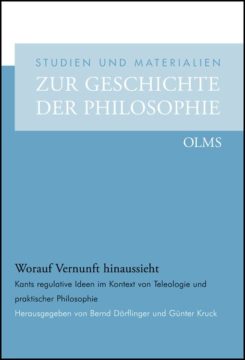Über die Ideen der theoretischen Vernunft hinaus kennt die Ideenlehre Kants eine Reihe von Ideen reflektierender Urteilskraft und praktischer Vernunft, deren Status, ob konstitutiv oder regulativ, deren systematischer Zusammenhang und deren Legitimation nicht offensichtlich sind. Die Beiträge dieses Bandes stellen Versuche einer Klärung dar, etwa hinsichtlich der Modifikationen der Idee der Zweckmäßigkeit, die die Kritik der Urteilskraft als ästhetische, organologische und ethiko-theologische Zweckmäßigkeit entfaltet. Außerdem wird Zweckmäßigkeit auch in Gestalt der Frage nach dem Fortschritt zum Besseren in der Geschichte thematisiert. Weitere Beiträge diskutieren Ideen der moralisch-praktischen Vernunft, die Freiheitsidee, die personifizierte Idee des Guten, und der Rechtsvernunft, etwa die Staats- und die Völkerrechtsidee.
***************
In addition to theoretical reason, Kant’s theory of ideas recognises a number of ideas of reflective judgment and of practical reason. Their status (constitutive or regulative), systematic coherence and legitimation are not obvious. The essays in this volume seek to offer clarification, for example by modifying the idea of purposiveness which the Critique of Judgement develops as aesthetic, organological and ethico-theological purposiveness. Purposiveness is also thematised as the question of historical progress towards improvement. Other contributions discuss ideas of moral and practical reason, the idea of freedom, the personified idea of goodness, and legal reason, e.g. the forms of national and international law.
- Veröffentlicht am Samstag 11. Januar 2025 von Olms, Georg
- ISBN: 9783487148786
- 196 Seiten
- Genre: Aufklärung, Hardcover, Philosophie, Renaissance, Softcover
